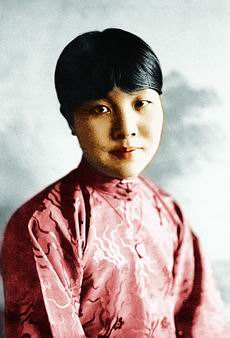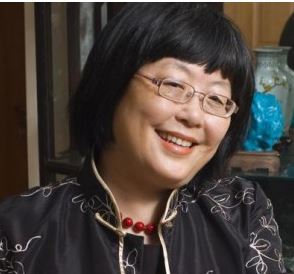
Qian Zhongshu, also transliterated as Ch'ien Chung-shu or Dzien Tsoong-su, was a renowned 20th century Chinese literary scholar and writer, known for his wit and erudition.

Fortress Besieged is a Chinese satirical novel written by Qian Zhongshu, first published in 1947, and widely considered one of the masterpieces of twentieth century Chinese literature. The novel is a humorous tale about middle-class Chinese society in the late 1930s. It gained worldwide popularity after it was reprinted in the 1980s and made into a television series in 1990.
The Lu Xun Literary Prize 鲁迅文学奖 is a literary prize awarded by China Writers Association. It is one of China's top four literary prizes and is named after Lu Xun and has been awarded every three years since 1995. Its predecessor, the National Outstanding Short Story Award and National Outstanding Novella Award, was established since the beginning of the new-era literature in the early 1980s.

Qian Qianyi was a Chinese historian, poet, and politician during the late Ming dynasty. Qian was a famous author and poet; and along with Gong Dingzi and Wu Weiye was known as one of the Three Masters of Jiangdong.

Xie Wanying, better known by her pen name Bing Xin or Xie Bingxin, was one of the most prolific Chinese women writers of the 20th century. Many of her works were written for young readers. She was the chairperson of the China Federation of Literary and Art Circles. Her pen name Bing Xin carries the meaning of a morally pure heart, and is taken from a line in a Tang dynasty poem by Wang Changling.

Yang Jiang was a Chinese playwright, author, and translator. She wrote several successful comedies, and was the first Chinese person to produce a complete Chinese version of Miguel de Cervantes' novel Don Quixote.
The literary inquisition, also known as speech crime (以言入罪), refers to official persecution of intellectuals for their writings in China. The Hanyu Da Cidian defines it as "the ruler deliberately extracts words or phrases from intellectual's writings and arbitrarily accuse him in order to persecute him" ("旧时谓统治者为迫害知识分子,故意从其著作中摘取字句,罗织成罪"). The inquisition took place under each of the dynasties ruling China, although the Ming dynasty was particularly notorious for the practice.
Qian Yunhui, a 53-year-old elected and popular eastern Zhejiang province village head who had a long history of petitioning against alleged abuses by local government, died on December 25, 2010, after being crushed by the front wheel of a truck loaded with crushed rocks for a nearby building site operated by the Yueqing Electric Power Plant. Rumors emerged stating that Qian was held on the ground by four men in security personnel uniforms while the truck was driven slowly over him. A government press conference a week later announced that Qian had died in an ordinary traffic accident, struck and killed crossing the road. An eyewitness by the name of Qian Chengwei said that he saw that four uniformed men held the victim down on the ground while the truck went on top of him. The eyewitness had since been arrested and detained by the police. Other eyewitnesses including villager Huang Diyan, claimed she saw four uniformed men with gloves struggle with Qian and then put his body under the front tire by force. The truck's owner/driver, Fei Liangyu was detained by the police, along with other villagers who questioned the police's investigation, including Qian's daughter.
Wen Jieruo is a Chinese translator, author and editor. She translated literature from English and Japanese to Chinese. Wen is a member of China Writers Association and Chinese Translation Association. She is fluent in both English and Japanese.
Dai Houying was a Chinese woman novelist, and one of the first Chinese writers to criticize the devastating decade-long Cultural Revolution.

Yilin Zhong is a British-Chinese journalist, screenwriter and author. She is the author of seventeen novels, two film screenplays, ten books and many other work including poems and literary reviews. She currently lives in London.
Post 70s Generation is a literary critical term in Chinese contemporary literature, which refers to the new generation of writers who were born after 1970 in China. In some criticism these writers have also been described as the 'Post Cultural Revolution Generation', or 'Post Maoism Generation' as they grew up after Mao's death.

Cheng Naishan was a writer from China who came from an upper-class background, had lived in Hong Kong, was trained in the English language, and was a Christian. Unlike her contemporaries, she taught English and later wrote in English. One of the most well-known of the Shanghai School (haipai) writing style, Cheng revived the literary legacy of the elites who had been rejected during the Cultural Revolution. She won numerous awards for her novels and short stories before embarking on a series of non-fiction works telling the history of "Old Shanghai".

"Tian Qilang" is a short story by Pu Songling first published in Strange Tales from a Chinese Studio (1740). The story revolves around Wu Chengxiu, who befriends the title character, a young hunter, and the series of unfortunate events they experience thereafter. In writing "Tian Qilang", Pu was heavily influenced by biographies of famous assassins in Records of the Grand Historian by Sima Qian; Pu's story has in turn been adapted into a television series story arc, a film, and a play.
Yin Jianling is a Chinese writer of children's literature. She is senior editor of the Shanghai newspaper Xinmin wanbao.

Feng Yidai was a Chinese author, editor, and translator. Born in Hangzhou, he studied in Shanghai and thereafter began an illustrious career in publishing and editing. He was denounced as a "rightist" during Mao Zedong's Anti-Rightist Campaign. He was politically rehabilitated after the Cultural Revolution and resumed his literary career. He married the actress and writer Huang Zongying in 1993. A few years before his death, he published his diaries and confessed his secret role as a government spy during the Anti-Rightist Campaign.
Kiyoko Murata is a Japanese writer. She has won the Akutagawa Prize, the Noma Literary Prize, and the Yomiuri Prize, among other literary prizes. The Government of Japan has awarded her the Medal with Purple Ribbon and Order of the Rising Sun, and she has been appointed to the Japan Art Academy. Her work has been adapted for film by Akira Kurosawa and Hideo Onchi.
Yang Yihua, who writes under the pen name Chen Cun (陈村), is a Hui Chinese novelist known for his stories about the zhiqing experience during the Cultural Revolution. He is also one of the pioneers of electronic literature in China.

Lu Li'an is a scholar of British literature, professor at Fudan University, and president of the Shanghai Taiwan Compatriots Friendship Association. Born in Taiwan, she moved to mainland China in 1997 to teach at Fudan University in Shanghai and became a citizen of the People's Republic of China (PRC). In 2017, she was a delegate to the 19th National Congress of the Communist Party of China, and the same year, the Republic of China (ROC) government revoked her registered residency in Taiwan.
Peng Sanyuan, born Peng Mingyan, is a Chinese female film director, a writer from mainland China, a screenwriter of film and television works, and a member of the China Writers Association.









